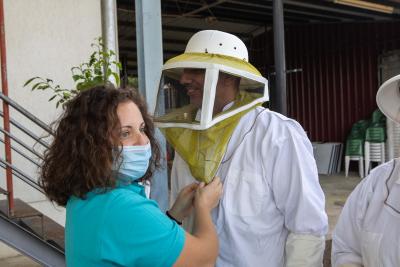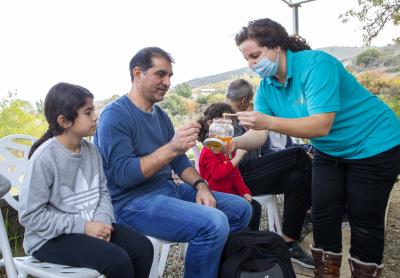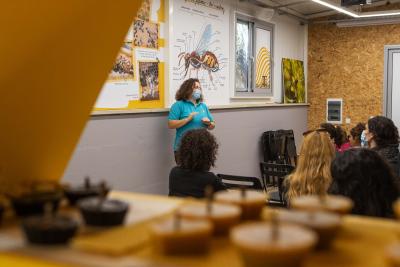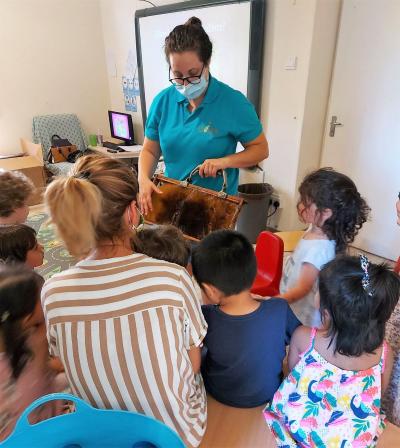Discover the potential of the beekeeping sector in Cyprus: interview with Georgia Shoshilou on World Bee Day
On the 20th May, World Bee Day, the ENI CBC Med programme decided to take you to the nice mountains of Larnaca in Cyprus and more precisely in the village of Vavla to have a little chat with Georgia Shoshilou.
She is a member of the board of the Pancyprian Beekeepers Association, an associated partner of MedBEESinessHubs project, and co-founder of G.S ECOPHYSIS Ltd, a family business that offers experiential and educational tours to visitors with special interests in the nature, rural lifestyle and traditional products of Cyprus. As a visitor, you can become a beekeeper for a day, make your own candle from beeswax, hike and discover wild plants and taste local products made out of honey.


The story started with a biologist falling in love with a beekeeper. That's how ECOPHYSIS Bee & Nature Center was born. They are both passionate. He offers the technical knowledge about beekeeping; she loves teaching about the importance of preserving the nature and has the scientific knowledge related to it. She also has the spirit of an entrepreneur and the will to always innovate and diversify her activities. They are like an open book and have no secrets to hide. And probably, this is one more reason why ECOPHYSIS Center´ visitors appreciate them that much. They find authenticity, nature, a relaxing environment. They can enjoy it all with the great company of Georgia and her husband.
However, real life is not only about dreams coming true. Or at least, to turn your dreams into a reality, you need lots of hard work, patience, passion and trust.
But first of all, why bees are so important that in 2017, the Food and Agriculture Organisation of the United Nations (FAO) declared the 20th May, World Bee Day?
The power of bees on nature, people and minds
As Georgia recalls, over 50% of our food depends on pollinators and bees are the most important ones. They preserve the biodiversity and thanks to them, we ensure food security in the world. The lockdown during the Covid-19 pandemic showed how many people started fearing from the possibility of lacking food while people like Georgia were confident as they live in the countryside and being beekeepers make them ensure there will be enough food.
We have a lot to learn from bees. They make us understand our position in nature
Bees are much more than guardians of our environment. They educate us. They make us understand our position in nature. They do not act like selfish creatures, they work in group, they have a goal to achieve, and they work hard for it.
Bees do not only ensure food production for people but also for animals. They make products of high value. Honey is not only a sweetener, but it also has anti-bacterial properties, it can act as a pain relief. Bees do not only produce honey. You can develop a wide range of products: propolis, cosmetics that do not expire, super food such as pollen or royal jelly. But it is true, that above all, they help us preserve the ecosystem.


Mediterranean honey: tastier and with more nutrients
Georgia has an answer to nearly all questions. She explains that due to the Mediterranean climate, the honey produced in Cyprus contains less humidity (about 13%), well below the humidity percentage found in other parts of Europe (up to 20%). This leads to produce a more concentrated honey, tastier and with more nutrients. As it has less humidity, it also lasts longer than other types of honey without getting bad.
Challenges of the beekeeping sector in Cyprus
Knowing the importance of bees for people, the environment and all they can offer, why the bee sector is facing so many challenges in Cyprus and what can be done?
First of all, Cypriot honey competes with cheaper imported honey so beekeepers cannot keep up with such low prices. They cannot sell their jar of honey so that it does not even cover the cost of production. This turns it into a non-profitable sector and people see beekeeping as a hobby but not as a way to make a living. The sector needs professional beekeepers and cannot rely only on people doing it as a hobby otherwise the profession will disappear.
We need professionals in the beekeeping sector, we don't want to disappear
Like other productive sectors such as farming, beekeeping is not seen as an attractive job opportunity for young people. They associate it with working long hours under the sun with low income in return.
When Georgia asks the relevant department about the need to recruit someone to pursue her activities at ECHOPHYSIS, she faces administrative constraints due to the lack of flexibility. You either belong to the beekeeping sector or to another category. It is not foreseen that the same person can belong to the beekeeping sector, the educational one and the eco-touristic one which make her life more difficult when she tries to develop her business.
If consumers were valuing the products and willing to pay a fair price, if producers were also valuing their raw material asking for a fair price and if measures were taken to encourage the diversification of beekeeping activities, then the sector may flourish in Cyprus and in other Mediterranean regions.
MedBEEsinessHubs or how to support young people from rural areas to start their BEEisness
Georgia is a living example that as a young Mediterranean person, you can perfectly live from the bee sector. You need to think out of the box and see this sector as a whole and not only as beekeeping tasks. You need to diversify the activity, and this requires more than technical skills related to beekeeping, such as administrative and financial management, marketing and even lobbying to make sure this sector is valued and recognised as it should be.
The PanCyprian Beekeeper Association supports beekeepers as it provides them with technical assistance. For example, there is vet who examines the hives, advise beekeepers to ensure the health of bees, how to handle them, how to store honey. The association also coordinates the different funds they receive from the State and the European Union. It also organises campaigns to promote the sector through festival, TV programmes or in schools.
Raising awareness at different levels: producers, consumers, children and adults about the importance of the sector and how it could benefit to all on economic and environmental level. Then training the younger generation so that they are fully prepared to start the BEE adventure are among MedBEEsinessHubs objectives which Georgia, her husband and the PanCyprian Beekeeper association are contributing to.







